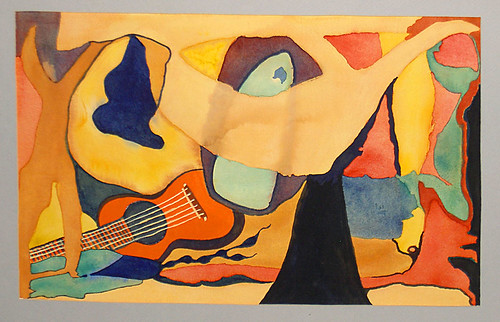J'veux pas y'aller à ce dîner, j'ai pas l'moral, j'suis fatigué, ils nous en voudront pas, allez on n'y va pas. En plus faut que je fasse un régime ma chemise me boudine, j'ai l'air d'une chipolata, je peux pas sortir comme ça. Ça n'a rien à voir je les aime bien tes amis, mais je veux pas les voir parce que j'ai pas envie.
On s'en fout, on n'y va pas, on n'a qu'à se cacher sous les draps, on commandera des pizzas, toi la télé et moi, on appelle, on s'excuse, on improvise, on trouve quelque chose, on n'a qu'à dire à tes amis qu'on les aime pas et puis tant pis.
-- Bénabar, "le Diner"
Being in the presence of genius is quite humbling. I crouched in a padded chair (not in a padded room) in a small theatre in an old building on a dark night in January. Before me were arrayed six people, implements of destruction scattered about them, recognizable instruments almost overshadowed by a vertible heap of percussion implements which included several kitchen utensils and a bucket. Besides the flute-, tambourine-, bucket-, chimes-, and miscellaneous percussion-playing woman with a blues singer's lungs there was the eccentric frontman--his guitar lovingly strangled by a wifebeater--a drummer looking like a runaway Beatles wannabe, an additional percussionist, a saxophonist complete with beard, and an exceptionally awkward fiddler. This was not the genius of which I spoke, but rather the opening act, an eccentric jam band from Denver with a Moldy Peaches-meets-Devotchk kind of sound, campy but amusing lyrics, a propensity for electronic effects and shredding and strange, stretching jam riffs which threatened to devolve into utter chaos but somehow managed to transform itself into a different song.
No, genius was Tom Hagerman of Devotchka, who started his "solo" set with a piece he made up a few days ago, obscenely complex. With the aid of two violinists, a violist, a cellist-cum-pianist and an accordian-bassist, Tom Hagerman played a series of inricate, fascinating pieces reminiscient of the Amelie soundtrack, beautiful accordion pieces that almost transported you to Paris or somewhere else. Accordion, intricate, complex melodies with classical and folk roots. It's not Devotchka, but they seem related, and I think the string section is the same that plays with Devotchka, or played with them at the concert I saw a year or so back. The truth is, Tom Hagerman is probably someone who can play any instrument if you leave him alone with it for five minutes. He just oozes musicality as other people ooze awkwardness--or pus. He's just.... wow.
No Youtube videos to post, but go listen to his stuff HERE
Mir wurde gesagt, sei stumm, es ist besser, nichts preiszugeben. Es preiszugeben oder eben nicht, das Prärogativ steht mir durchaus zu. Mich kennst du vielleicht nicht so gut, wie du es dir denkst, denn eine solch verschlossene Person zeigt immer nur die halbe Wahrheit, wird immer nur halbwegs enthüllt. Es ist auch besser so, der Welt die eigene Person zu zeigen ist nur Verschwendung. Der Wind trägt meine Geheimnisse, vergessene in den Sturm hinein gerufene Beichten. Nur eine Person rennt mir hinterher, sie holt mich ein, behält den hart umkämpften Vorsprung, um die Ecke. Manchmal ist sie vor mir, nicht zu fangen. Manchmal ist sie weit hinter mir, schnell ist sie und schlagfertig, sie ist nicht so leicht kleinzukriegen, die Zeit. Mir rennt sonst keiner hinterher--er würde mich nicht fangen können, ich löse mich einfach ab--und mir gefällt es auch besser so. Die Träume will ich nicht aufgeben, in einer Käfig will ich niemals sein, auch nicht in einer der eigenen Schaffung. So einfach ist es, und gleichzeitig so kompliziert. Verschlossene Menschen verpassen viel, doch will ich nicht den Wildtieren ausgesetzt sein. Und du? Es kann sein, dass du mich langweilst, dass du dich selbst langweilst, und von der in die Ewigkeit hinfließenden Langeweile nichts ahnst. Es möge sein. Meine Aufgabe ist es nicht, dich wie ein Hundchen zu erziehen; deine Aufgabe war es, mich vor der Flut zu und der Furcht zu schützen. Deine Ansprüche sind zu niedrig, meine sind zu hoch, und dadurch rennen wir aneinander vorbei (wir winken uns aber zu, wie es sich ja gehört). Mich kannst auch du nicht fangen, auch wenn du rennst.
Und dennoch bleibt etwas, haftet an mich fest und streckt die kleinen Finger Glaubensrichtung, zupft am Ärmel und will auf den Schoss. Straff und mickrig, zierlich zärtlich und obendrein zerbrechlich passt es, dieses Etwas, auf der Handfläche und auch in den kleinsten Ecken, deren Konstellation meine Welt bestimmt. Die Modalverben sind die wahre Wahrheit, nur sie beschrieben die Unbestimmtheit des Könnens-Mögens-Dürfens-Wollens-Müssens-Sollens--- der Ausrede, die wir uns selbst sagen, um nicht gegen Tatsachen ringen zu müssen.
There's nothing I could say
To make you try to feel ok
And nothing you could do
To stop me feeling the way I do
And if the chance should happen
That I never see you again
Just remember that I'll always love you
I'd be a better person
On the other side I'm sure
You'd find a way to help yourself
And find another door
To shrug off minor incidents
And make us both feel proud
I just wish I could be there
To see you through
You always were the one
To make us stand out in a crowd
Though every once upon a while
Your head was in the cloud
There's nothing you could never do
To ever let me down
And remember that I'll always love you
--Badly Drawn Boy, "A Minor Incident"
In other news, "it's official: mail is slow as snails". This must be related to the guy who set out to prove whether Kansas was really as flat as a pancake, and belongs under the heading "Too Much Spare Time".
And I thought I had homework to do....
.jpg)

















